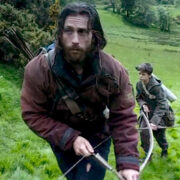The Beginner’s Guide: Paul Thomas Anderson, Director
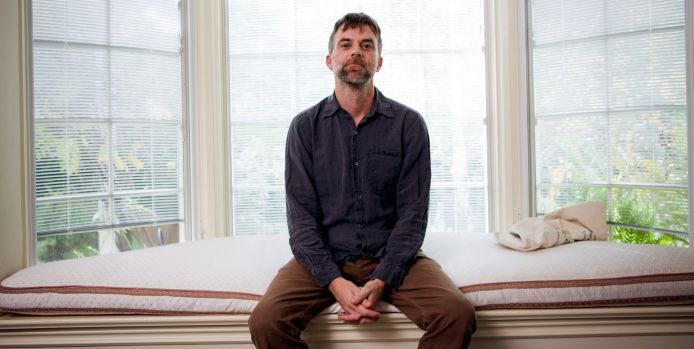
Jay is just a dude who takes in an unhealthy…
Stories are built around characters. No matter how complex and fascinating a narrative may be, the only way to make people care is by implanting interesting characters to whom we can relate, root for, loathe, or sympathize with. Character creation is a skill that too few filmmakers possess today. But if there is one master of character building, it is Paul Thomas Anderson.
More than any other writer/director today, Anderson is able to create worlds and characters that completely absorb the viewer. There is something about being a writer and director that can make a good script even greater or, on the flip-side, a bad script even worse. Fortunately for Anderson, it seems that he is incapable of writing a bad script and his direction will be studied in film schools for the rest of time. He is a master craftsman who has never been at anything other than the top of his game.
His limited output (this December’s Inherent Vice will be only his 7th film in 18 years) is a blessing for his legacy; when you have only seen people accomplish great things it is impossible to remember the bad times. Even directors like Kubrick, Scorsese, Fincher, and Nolan have blemishes on their record, while Anderson has refused to put out anything less than transcendent (at least since Boogie Nights).
For those who have never experienced Anderson’s films, or if you are an old fan who wants to relive all of his works, I give you the beginner’s guide to Paul Thomas Anderson.
Hard Eight (1996), The Beginning of a Great Thing
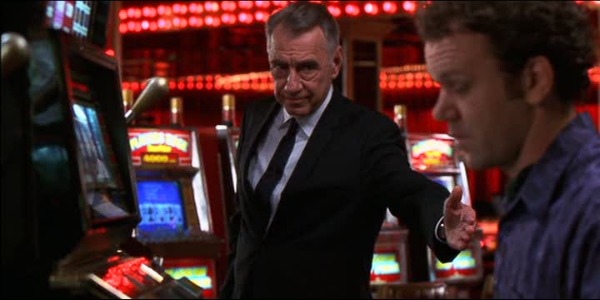
Let’s get this out of the way first: yes, Anderson’s 1996 directorial debut is probably his worst film. But this is a testament to how great all of the films that came after are, not a putdown towards Hard Eight. Anderson was able to assemble a great cast for his first feature, including Samuel L. Jackson, Gwyneth Paltrow, Philip Baker Hall, Philip Seymour Hoffman, and John C. Reilly.
One thing that Anderson has always been able to do is bring together an ensemble of extremely talented performers. This is, again, a credit to his tremendous scripts. Even before they have experienced Anderson behind the camera, they want to bring his words to life in front of it. It is a very, very good movie that constantly raises the stakes and (as Anderson always does) builds compelling characters. The film never found its legs at the box office and was considered a commercial failure. But Anderson’s commercial viability was established when he blew everyone away with one of the best films of the last 20 years. That film…?
Boogie Nights (1997), A World Fully Imagined
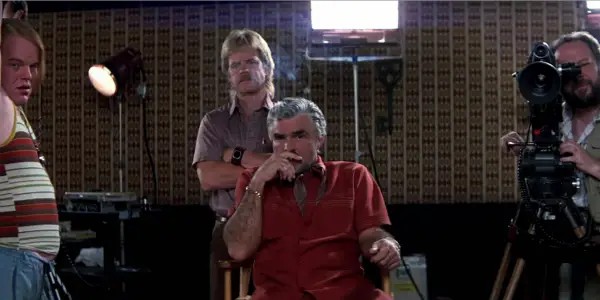
Let me prevent a hypothetical situation to you: Your whole life you have wanted nothing more than to be able to create films for a living. You showed great ability in your first film, but it didn’t have much commercial success. So what do you do next? Many people would play it safe and make a film that would appeal to as broad an audience as possible. This is not what Paul Thomas Anderson did. That’s not how he’s wired.
Instead, he decided to make a movie about the 1970’s porn industry. That is the complete opposite of mainstream appeal. But sometimes, tremendous quality will bring audiences to the theatre, even if the subject matter is a bit racy for their taste. One of Anderson’s best decisions in Boogie Nights was to not explicitly show very much of the sex that you know is taking place. The film is about the world of sex, not the sex itself. And what a lively world it is: The music makes you want to dance, the outfits make you smile, and the huge number of eclectic characters makes you envious of Anderson’s mastery of the craft, even at the ripe age of 27. In fact, the story originated from a short film he shot when he was only 18 years old.
It is Anderson’s most purely fun movie to date. You can tell that this was a passion project for him. But Boogie Nights is not all lighthearted disco music. The story of Dirk Diggler’s rise to fame in the porn industry has some very dark moments and extremely emotional ones, too. There is plenty of violence when you don’t expect it (sometimes rattling, sometimes comical), as well. The performances from everyone involved (and especially the one from Burt Reynolds) are phenomenal. Mark Wahlberg, who at the time was most famous for rapping and being the Calvin Klein underwear poster child, puts on what is far and away his greatest performance as the film’s protagonist, Dirk Diggler. A film that doesn’t take itself too seriously but also packs an emotional punch is a rare find, and Boogie Nights is a breath of fresh air every single time you watch it.
Magnolia (1999), The Bold and the Beautiful

Magnolia is an absolute behemoth of a film. With a running time of 3 hours and 8 minutes, many casual filmgoers may have a hard time watching it in one sitting. But I promise that sitting through all of it is a rewarding experience. Very rarely has a movie made me feel in a way that Magnolia has. It is as much an experience as it is a film. It is an expansive film that covers a handful of separate plots that have only very loose connections.
There is a quiz show prodigy (Jeremy Blackman) with an abusive father (Michael Bowen). The show is hosted by a man (Philip Baker Hall) whose daughter (Melora Walters) is a recovering drug addict. This drug addict is currently being pursued by a cop (John C. Reilly) who was called to investigate her apartment after a noise complaint. The show’s producer is on his deathbed and wants his son (Tom Cruise) to forgive him for all of the wrongs he has committed towards him. And that’s not even all of the narratives. The connections between the characters are more thematic than anything, focusing on the influence a father has on his children. This is a theme that Anderson explores in just about every film he makes, but he does it most directly in Magnolia.
We have all seen tons of movies that have seemingly unrelated characters thread their stories together, but Magnolia does it in a way I had never seen before and haven’t seen since. Cruise is absolutely phenomenal in the film and those who view him as a vanilla action star will see him in a new light after seeing the film. It is a bold film, and it is Anderson’s most divisive. If nothing more, it will give everyone something to talk about. But those who view it the way I do will be moved and reflective long after the end of Magnolia.
Punch-Drunk Love (2002), Back to Basics
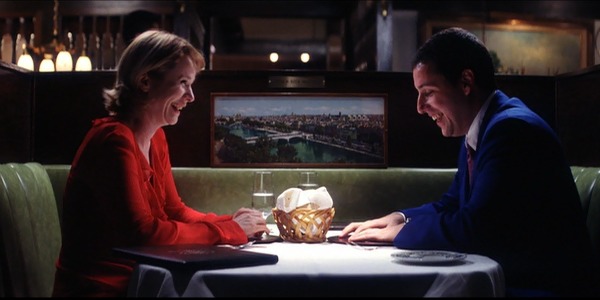
The boldness of Magnolia must have left Paul Thomas Anderson for a little levity in his professional life. It is a bit of a stretch to call Punch-Drunk Love a full-blown comedy, but it has lots of laughs and makes me hate every Adam Sandler movie that has come after it because he is legitimately very good in it. After the 3-hour marathon that was Magnolia, Punch-Drunk Love comes in at a smooth hour and a half. It is a very sweet story of a lonely man’s quest for love. He goes from calling phone sex lines to kissing the woman of his dreams in a beautiful silhouetted hallway scene. Philip Seymour Hoffman is great again as the man behind the scene of the phone sex line and he provides the most laughs in the film with his over the top reaming of Sandler.
After the divisiveness of Magnolia, this film didn’t garner all of the passion (both positive and negative) that Anderson had experienced with his last film, which must have been a welcome side effect of a more traditional movie that is hard to hate, but also doesn’t garner the type of praise that his other films do. Like all of Anderson’s work, it is absolutely worth a watch, even if it isn’t as transcendent as some of his other films. It is his most lighthearted, whimsical film, and is a breeze to watch. For more casual moviegoers, this may actually be your favorite of Anderson’s films.
There Will Be Blood (2007), A Modern Masterpiece
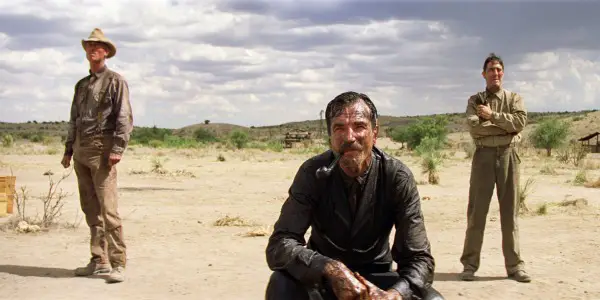
There is nothing wrong with There Will Be Blood. There is not one thing that I could imagine changing about it to make it any better than it is. The pacing is perfect. The score (composed by Radiohead guitarist Johnny Greenwood) is uniquely brilliant. Daniel Day-Lewis gives the best performance of his career. I could go on and on, but I will spare you the gushing. There Will Be Blood is the story of a silver miner turned oil tycoon who loses all sense of morality as his empire grows. Think of it as the more intense, overachieving brother of Citizen Kane.
It is a story that addresses issues with organized religion and capitalism, but at its core is, once again, fatherhood. Daniel Day-Lewis’ Daniel Plainview begins the film as a caring adopted father, only to exploit him for his own personal gain. Plainview’s spiral into nihilism is an absolute wonder to behold. Each and every scene is one that you will never forget. At its core, There Will Be Blood is a pretty straightforward film that explores themes not unfamiliar to frequent filmgoers. But the way Anderson is able to intertwine a multitude of familiar themes and maintain an incredible level of intensity makes it one of the greatest films ever made.
If you watch one Paul Thomas Anderson film, make it this one. I hate using superlatives, but this very well could be the best film of the new millennium. This film is my 2001: A Space Odyssey. This is the film that made me realize that movies are art. After seeing this film, I never looked at cinema the same. It is captivating from start to finish, features incredible performances and stunning visuals, and the film’s final scene is a master class in acting by Daniel Day-Lewis with a shocking ending that completes Daniel Plainview’s journey into the moral abyss.
The Master (2012), A Gripping Character Study

It is easy to over-complicate The Master. There is a lot going on, but it explores the one thing Anderson is most curious about: family. And in this case, like in Boogie Nights, the film’s protagonist searches for a surrogate family after straying away from his blood family. The late Philip Seymour Hoffman plays the titular “Master”, a character based on L. Ron Hubbard, the founder of Scientology.
One day, Freddie Quell (Joaquin Phoenix) stumbles upon The Master and his crew on a boat. Freddie has been spending his days drinking paint thinner and picking fights in department stores, unsure of where to go after returning from service in World War II. Joaquin Phoenix is best when he is acting like a complete weirdo, and Freddie Quell meshes perfectly with Phoenix’s talents (it is surely the best film in history to feature a man humping a sand-sculpted woman). Meanwhile, Philip Seymour Hoffman showed us once again that he was one of the greatest actors of his generation. When he speaks, you even consider taking up The Cause that he is pushing his followers to abide to. It is a commanding performance that should be admired for years to come.
Perhaps the most striking thing about The Master is its use of lighting. The large majority of the film is incredibly bright, a stark contrast to the dim films today that want to portray seriousness. However, one dimly lit scene is perhaps the film’s most memorable. In it, Phoenix undergoes “Processing”, a series of questions meant to establish what exactly is keeping Freddie from attaining satisfaction. The dialogue goes back and forth at a fast pace, everything feeling so fluid and natural.
The Master is mostly memorable for the performances of its two leads, and they are responsible for the central theme of the story, but there are many other things being explored here. It is a very difficult film to get a grasp on with only one viewing, but each time I watch it, another layer of the thematic onion is peeled off.
The Future
This winter, Anderson will be releasing what he calls his first true comedy, Inherent Vice. Based on a novel by Thomas Pynchon, the film stars Joaquin Phoenix as a pothead P.I. in the early 1970s. The novel is a very funny noir with many, many twists and turns. With Anderson’s history, the chances are very high that it will be great. He is one of the best writer/directors of all-time. If you haven’t given him a shot yet, I am urging you to do so. He has never produced anything less than a great film., and I don’t believe he ever will.
(top image source unknown)
Does content like this matter to you?
Become a Member and support film journalism. Unlock access to all of Film Inquiry`s great articles. Join a community of like-minded readers who are passionate about cinema - get access to our private members Network, give back to independent filmmakers, and more.
Jay is just a dude who takes in an unhealthy amount of media of all types. Currently living in Atlanta, Georgia, he firmly believes that all movie theaters should have leather recliners, you eat popcorn too loudly, and if you don't put that cellphone away in 2 seconds you will learn the definition of frontier justice.








